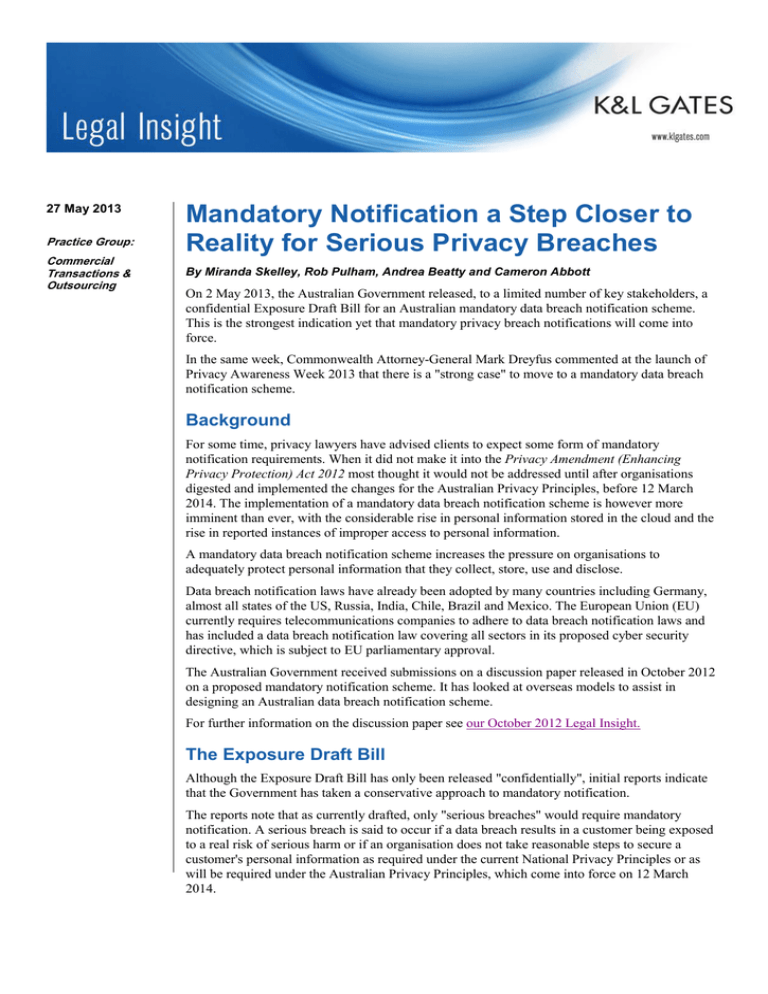
27 May 2013
Practice Group:
Commercial
Transactions &
Outsourcing
Mandatory Notification a Step Closer to
Reality for Serious Privacy Breaches
By Miranda Skelley, Rob Pulham, Andrea Beatty and Cameron Abbott
On 2 May 2013, the Australian Government released, to a limited number of key stakeholders, a
confidential Exposure Draft Bill for an Australian mandatory data breach notification scheme.
This is the strongest indication yet that mandatory privacy breach notifications will come into
force.
In the same week, Commonwealth Attorney-General Mark Dreyfus commented at the launch of
Privacy Awareness Week 2013 that there is a "strong case" to move to a mandatory data breach
notification scheme.
Background
For some time, privacy lawyers have advised clients to expect some form of mandatory
notification requirements. When it did not make it into the Privacy Amendment (Enhancing
Privacy Protection) Act 2012 most thought it would not be addressed until after organisations
digested and implemented the changes for the Australian Privacy Principles, before 12 March
2014. The implementation of a mandatory data breach notification scheme is however more
imminent than ever, with the considerable rise in personal information stored in the cloud and the
rise in reported instances of improper access to personal information.
A mandatory data breach notification scheme increases the pressure on organisations to
adequately protect personal information that they collect, store, use and disclose.
Data breach notification laws have already been adopted by many countries including Germany,
almost all states of the US, Russia, India, Chile, Brazil and Mexico. The European Union (EU)
currently requires telecommunications companies to adhere to data breach notification laws and
has included a data breach notification law covering all sectors in its proposed cyber security
directive, which is subject to EU parliamentary approval.
The Australian Government received submissions on a discussion paper released in October 2012
on a proposed mandatory notification scheme. It has looked at overseas models to assist in
designing an Australian data breach notification scheme.
For further information on the discussion paper see our October 2012 Legal Insight.
The Exposure Draft Bill
Although the Exposure Draft Bill has only been released "confidentially", initial reports indicate
that the Government has taken a conservative approach to mandatory notification.
The reports note that as currently drafted, only "serious breaches" would require mandatory
notification. A serious breach is said to occur if a data breach results in a customer being exposed
to a real risk of serious harm or if an organisation does not take reasonable steps to secure a
customer's personal information as required under the current National Privacy Principles or as
will be required under the Australian Privacy Principles, which come into force on 12 March
2014.
Mandatory Notification a Reality for Serious Privacy
Breaches
Under the proposed mandatory notification scheme, when a serious data breach occurs,
organisations would be required to notify the individual customers affected by the breach as well
as notifying the Privacy Commissioner.
It is proposed that the Privacy Commissioner will be able to apply for or enforce a range of
penalties including:
public notification of the breach (by posting a public statement to organisations' websites or
informing media outlets about the breach)
apply for court appearance and financial penalties for small-scale offenders (fines of up to
AUD34,000 for individuals or AUD170,000 for organisations)
apply for court appearance and financial penalties for repeat or serious offenders (fines of up to
AUD340,000 for individuals or AUD1.7 million for organisations).
Law enforcement agencies are exempt under the Exposure Draft Bill which was deemed necessary
to avoid damaging the reputation and public confidence in the police service. The Privacy
Commissioner also has the power to provide exemptions to other organisations if it is deemed to
be in the public interest.
Finally, the reforms also introduce a new requirement to protect information from "interference",
not just misuse or loss, which is an element organisations will need to consider.
There are some reports that the mandatory data breach notification scheme could come into force
as soon as July this year (with a grace period), although other reports consider the changes will
come into effect at around the same time as the amendments to the Privacy Act 1988 (Cth) in
March 2014. However, until there is a clear indication from the Government as to its intention,
this remains to be seen.
We wait with interest for the public release of the Exposure Draft Bill and the Government's next
steps in implementing a mandatory data breach notification scheme in Australia.
What Does This Mean for Organisations
Together with the reforms to come into effect in March next year, these proposals introduce
greater financial penalties but, more importantly, give the Privacy Commissioner an increased
range of powers to investigate privacy practices. In 2011/2012, the Privacy Commissioner
instigated seven high profile own motion investigations with data breach elements. They related
to:
data security issues, including compromise of personal information due to malware (the
Privacy Commissioner found no failure to take reasonable steps)
exposure to hacking (the Privacy Commissioner found a failure to take adequate steps to
protect personal information)
a customer management tool becoming publically available (the Privacy Commissioner found
privacy failure at all stages, including failure to classify the project as involving privacy and
failure to follow privacy procedures).
With the enhanced powers we would expect a significantly expanded list of investigations in
2014.
At the Privacy Awareness Week Business Breakfast 2013, the Privacy Commissioner stated that
the Guide to Information Security released in April 2013 will be used in investigating data
breaches.
If the mandatory notification scheme is implemented as proposed, organisations will need to
ensure that in addition to their current privacy obligations under the Privacy Act 1988 (Cth), they
2
Mandatory Notification a Reality for Serious Privacy
Breaches
have adequate privacy practices and incident response mechanisms in place to identify and deal
with data breaches.
An emerging message appears to be that if organisations embed privacy impact assessments as an
integral part of projects and new product or service development, then they will meet the privacy
requirements by design and will be able to show that they have made "reasonable efforts".
To minimise the event of a data breach or risk of reputational damage, we recommend
organisations ensure data breach incident response mechanisms include a comprehensive
communications policy to enable an organisation to effectively communicate with the media and
customers.
Authors:
Cameron Abbott
Cameron.Abbott@klgates.com
+61.3.9640.4261
Andrea Beatty
Andrea.Beatty@klgates.com
+61.2.9513.2333
Rob Pulham
Rob.Pulham@klgates.com
+61.3.9640.4414
Miranda Skelley
Miranda.Skelley@klgates.com
+61.3.9640.4392
Anchorage Austin Beijing Berlin Boston Brisbane Brussels Charleston Charlotte Chicago Dallas Doha Dubai Fort Worth Frankfurt
Harrisburg Hong Kong Houston London Los Angeles Melbourne Miami Milan Moscow Newark New York Orange County Palo Alto
Paris Perth Pittsburgh Portland Raleigh Research Triangle Park San Diego San Francisco São Paulo Seattle Seoul Shanghai
Singapore Spokane Sydney Taipei Tokyo Warsaw Washington, D.C. Wilmington
K&L Gates practices out of 48 fully integrated offices located in the United States, Asia, Australia, Europe, the
Middle East and South America and represents leading global corporations, growth and middle-market
companies, capital markets participants and entrepreneurs in every major industry group as well as public
sector entities, educational institutions, philanthropic organizations and individuals. For more information
about K&L Gates or its locations, practices and registrations, visit www.klgates.com.
This publication is for informational purposes and does not contain or convey legal advice. The information herein should not be used or relied upon
in regard to any particular facts or circumstances without first consulting a lawyer.
©2013 K&L Gates LLP. All Rights Reserved.
3





